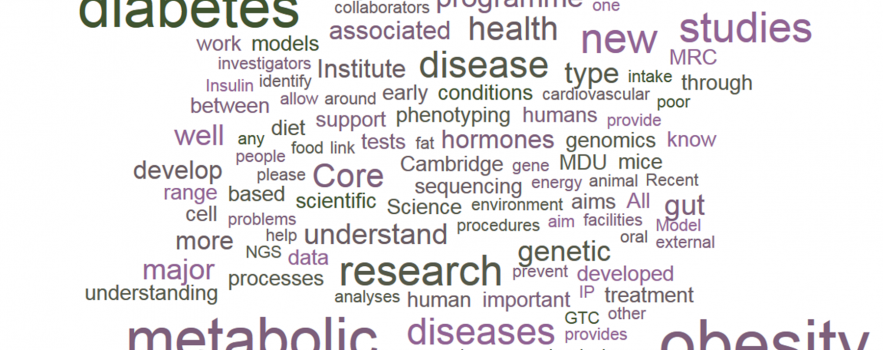The Institute of Metabolic Science - Metabolic Research Laboratories (IMS-MRL) (Director: Professor Sue Ozanne) brings together outstanding scientific and clinical researchers to form an international centre of excellence for research into metabolism and metabolic disease. It was established in 2008 with the goal of understanding the biological basis of diabetes, obesity and related disorders and translating scientific discoveries into improved patient care and disease prevention. Our strategic objectives are:
- To advance understanding of the control of energy balance, body composition and metabolic homeostasis, disturbances of which are at the heart of many common diseases
- To illuminate the mechanisms through which genetic and environmental factors, including sub-optimal nutrition across the life course, predispose to disorders such as obesity, insulin resistance, type 2 diabetes and fatty liver disease, and their accompanying increased risk of cardiovascular disease and certain cancers
- To exploit this new knowledge to improve the diagnosis, prevention and treatment of these disorders
The IMS-MRL comprises of approximately 200 staff, students and visiting researchers. We pride ourselves in being a vibrant and inclusive community working towards a common goal of improving the lives of those living with obesity and related conditions and ultimately striving to prevent these major health challenges of the 21st century.
The MRC Metabolic Diseases Unit
The IMS-MRL is the base for the MRC Metabolic Diseases Unit (MDU) (Director: Prof Sir Stephen O’Rahilly) that was established in 2013 and provides direct support for five high-quality programmes of research that aim to improve understanding of the basic mechanisms responsible for obesity and related metabolic diseases. It also includes key core facilities that support investigators based at the IMS-MRL and in the surrounding area. Such close ties with local Units and Institutes provide MDU scientists with unique opportunities to explore the genetic, epigenetic and physiological bases of obesity and metabolic disease across the life course.
The Discovery Research Platform for Integrating Metabolic and Endocrine Science
The IMS-MRL is also the base for the Wellcome Discovery Research Platform “Integrating Metabolic and Endocrine Science: A Discovery Research Platform for the Study of Metabolic Health and Disease”. It aims to address practical barriers preventing data integration across metabolic and endocrine science, investigate how hormones control metabolic processes and how these can go wrong in disorders such as obesity, diabetes and cachexia, and create tools to facilitate global access to this data. The Platform encompasses research on molecules, cells and model organisms but will have a major focus on discovery science in human participants, patients and populations.
The funding will sustain key technological platforms and the highly-trained staff needed to support these. It will also underpin partnerships with research centres across the UK as well as in Germany and Denmark, all of which will provide new opportunities for training.
The Platform will have a major focus on the broad dissemination of integrated data and the creation of tools to facilitate access by the global community. The award will also accelerate the team’s drive to make transformational changes to research culture with new initiatives in widening access and open science reinforced by a new programme of research into the culture of biomedical science, in collaboration with Dr Yeun Joon Kim, Associate Professor at the Cambridge Judge Business School who has joined the IMS-MRL as a Principal Investigator for the duration of this project.
Professor Sir Stephen O’Rahilly, PI for the Platform, said when the award was announced:
“Wellcome’s support of our scientists’ research in metabolism and endocrinology, and of the technological platforms that underpin it, has been critically important to the discoveries we have made and the translation of that research into improvements in health. This new award will allow us to build on those achievements and deliver more ground-breaking science in a manner that emphasises openness, diversity and a spirit of collaboration.”
Background
Obesity is a major and growing health concern. The number of adults living with obesity has doubled over the last thirty years and the number of children living with obesity has quadrupled over that same time period. It is associated with premature death and causes considerable ill health through its link with problems such as type 2 diabetes, cardiovascular disease and disorders of the joints, gastrointestinal tract and reproductive organs. It is also associated with increased rates of certain cancers. As well as impacting on physical health, obesity impacts on mental, economic and social well-being with those affected frequently being stigmatized. Such a major health threat requires multiple approaches across the life course. Identifying the environmental factors that have led to the recent increase in obesity and finding ways of altering the environment so that it is less unhealthy is clearly critical. However, even when individuals share the same environment, only some become obese. Similarly, while many obese people suffer adverse health consequences a substantial proportion do not. Understanding why this might be is crucial if we are to improve on current approaches to prevention and treatment of these diseases.



